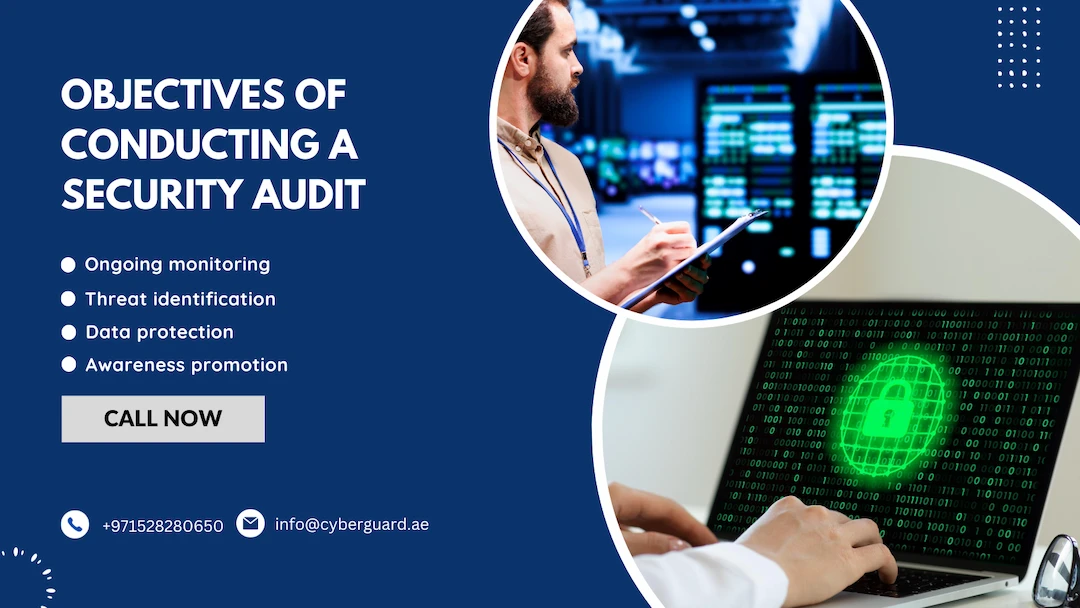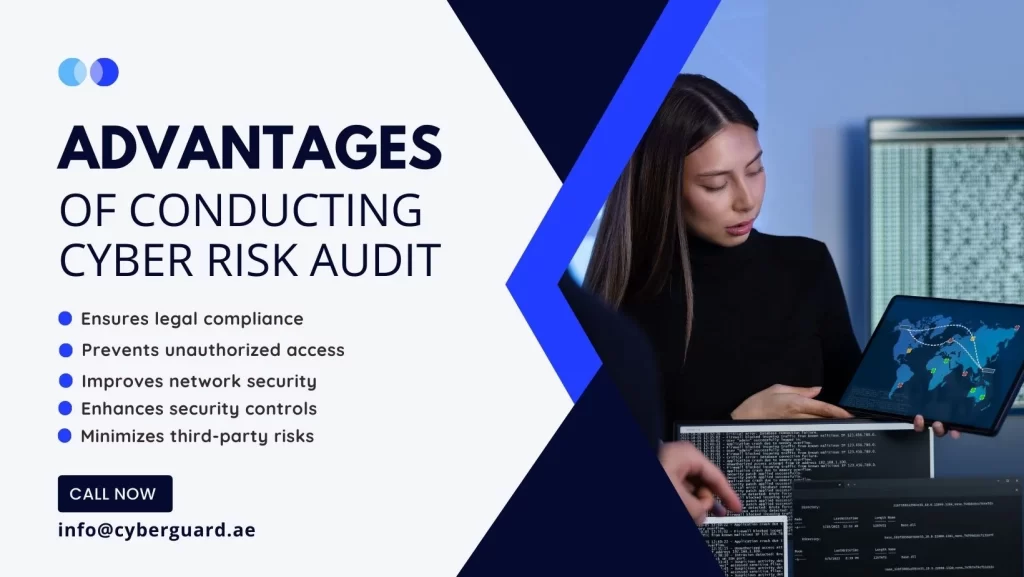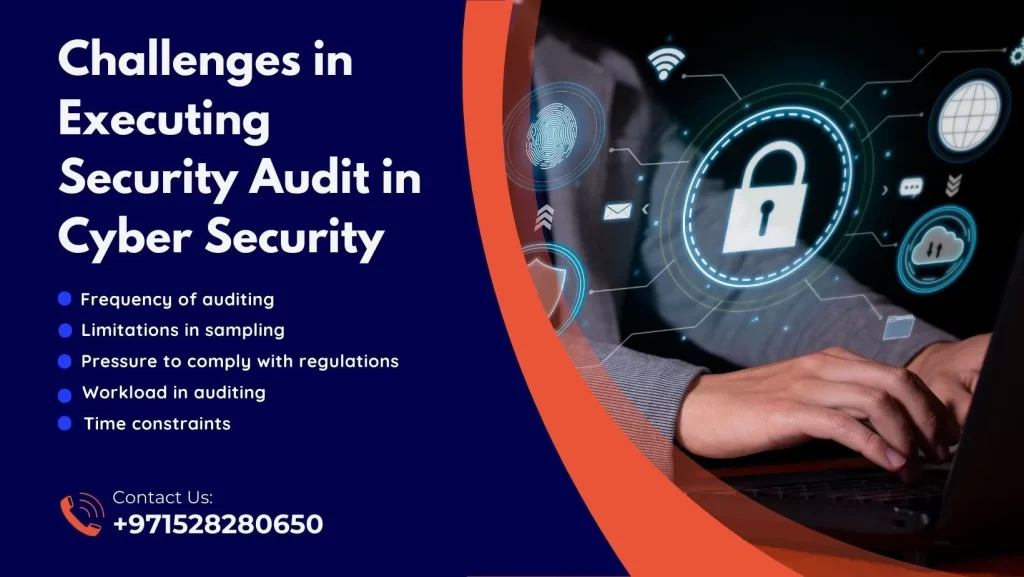Are you certain that your organisation’s defence mechanism and strategies are good enough to protect you from data breaches? There is no better way to ensure this than through a auditing in cyber security . In this blog, you will learn about the workings of cybersecurity audit, why it is important and how to conduct it.
What Is Cybersecurity Audit?
Cybersecurity audit refers to the systematic and meticulous assessment of the efficiency of a company’s IT resources. After performing this, the auditor will be able to show you the potential threats, vulnerabilities, and practices that could lead to data breaches and privacy violations.
What Are the Objectives of Conducting Auditing In Cyber Security?
Cyberattacks keep evolving from time to time. Therefore, auditing in cyber security are essential for every organization to stay protected from these evolving threats. The key objectives of auditing in cyber security include:

Ongoing monitoring:
Just like there are ongoing improvements in the technology, so are changes in the type of threats. Hence, ongoing monitoring of computer systems is necessary. Security audits promise this.
Threat identification:
An organization needs to understand the degree of vulnerabilities that their systems, networks and processes are subject to. One of the key objectives of security audits is to identify these vulnerabilities.
Data protection:
Data is the most valuable asset of every organization. Violation of data privacy would not only affect the reputation of a company but also cost it dearly in legal battles and proceedings.
Awareness promotion:
Through a auditing in cyber security program, organizations can understand the wrong security practices they have been following and learn the correct practices. This helps improve their security posture.
Advantages of Conducting Cyber Risk Audit
Organizations that run auditing in cyber security frequently are less likely to face cyber threats. This is because, from each audit, they gain valuable insights that could help them improve their posture. Discover the top five advantages of cyber security and auditing.

Ensures legal compliance:
Cybersecurity audits are part of legal compliance in most of the countries. For instance, PCI DSS, FISMA or GDPR.
Prevents unauthorized access:
Organizations need to follow strict policies to prevent authorized access to their systems. Through audits, the IT team can verify the access controls.
Improves network security:
The extent of risks that weak networks pose is immense. Through regular auditing, it is possible to raise the network security levels and thus prevent attacks.
Enhances security controls:
Security audits enable keeping watch of the security controls and assessing how efficient they are and whether they can safeguard against emerging threats.
Minimizes third-party risks:
Threats can come from collaborating with third-party services too. Audits help in identifying the chances of inviting such risks before they infiltrate your systems.
What Are the Different Types of Cyber Security Audits?
In terms of how they are performed, Auditing in cyber security are classified into two – internal security audits and external security audits. Let’s find out more about them.
Internal security audit:
Internal security audit is usually performed by the IT professionals within an organization. It can be carried out on an ad hoc basis when the organization assumes that its security posture is at risk. Companies can also hold it at regular or fixed intervals.
External security audit:
External security audits are performed by authorized auditors. It is done to fulfil multiple purposes such as to comply with government regulations/standards, to convince the stakeholders, business partners or customers, and to improve the overall security posture.
What Aspects of Security Does a Auditing In Cyber Security Cover?
In a typical IT auditing in cyber security, multiple security aspects are covered. The purpose of an audit is not to target a particular area and identify weaknesses but to look at it more generally and pinpoint the issues. Here are the top security areas/aspects covered in the typical audit.
Operational security:
Here the auditor will carry out meticulous evaluation of the organization’s access control and policies regarding the operations and procedures.
System security:
A system security audit will allow an organization to have its system records audited. This will help identify if there have been any attempts to security breaches.
Data security:
The data security of an organization is influenced by different factors like the nature of data storage and transmission, protocols used in data transfer etc. The audit will focus on these areas.
Network security:
This includes the careful reviewing of the organization’s network infrastructure including local area network configuration, internet access, firewall etc.
Physical security:
This will subject every physical component of the IT resources used in the organization such as storage devices, IoTs like kiosks, biometric scanners, multifactor authentication devices etc.
Major Challenges in Executing Security Audit In Cyber Security
An organization will have the best benefit from conducting a cybersecurity audit when several factors come together. Factors like the accuracy of the sampling, availability of time, regulations, etc may affect the process. Here are the top challenges in executing auditing in cyber security .

Frequency of auditing:
Here is no guarantee that a network security audit alone will fix all the problems and improve the organization’s security posture. The more frequently it is done, the better it is. But many organizations can’t afford it due to time and need for experienced professionals
Limitations in sampling:
Not all types of threats/vulnerabilities can be identified by the common methods of sampling used today. It is nearly impossible to identify an issue which has occurred due to human errors or overlooking from sampling.
Pressure to comply with regulations:
In many countries, there are strict government policies or regulations regarding data breaches and privacy violations. While these are good, they can slow down the auditing process as the organization needs to get prior approval before an audit.
Workload in auditing:
A comprehensive auditing in cyber security requires inspection of various IT resources of the company such as network, data storage devices, operational policies, and many more. Covering all these areas increases the workload of the auditor.
Time constraints:
IT auditing may take from a few days to a couple of weeks in some cases. No organization can afford to take such a long break from their operations, especially for those who are committed to offering services 24/7. So, they are forced to reduce auditing frequencies.
Best Practices Advised for Performing Auditing In Cyber Security
For the best result of the security audit in network security, it is important to follow the best practices. Discover some of the best strategies recommended for a comprehensive security audit.
Outline your network structure:
Before getting a team onboard to conduct auditing in cyber security, make sure to prepare a clear outline of your systems and network structure. This will help the team reduce time wastage.
Comply with standards and regulations:
Before the audit, check whether you are legally bound to comply with any regulation, for instance, permission from a government body. Also, implement safety standards for data and privacy protection.
Get it done by an authorized team:
Heck whether the team that you are onboarding for the computer security audit is authorized. Getting it done by a licensed team is essential to comply with government regulations.
Ensure the use of the right tools:
Ask the team to give you an overview of the technologies and tools they are using for the auditing. Remember that while automation tools can be used to identify vulnerabilities, they alone can’t give you a customized report
Bring tougher your policies:
Bring together all system policies you have in place such as Access Control Policy, Change Management Policy (CMP), Acceptable Use Policy (AUP), etc. Present the consolidated version to the auditor so that they don’t have to search for specific policies.
What Should Be the Frequency of Audit in Cyber Security?
Cyberattacks are evolving daily. Hence, it is advised to have a regular auditing in cyber security plan. If that is not possible, at least conduct an annual audit.
Conclusion
Auditing In Cyber security helps an organization to get an early insight into its strengths and weaknesses. It helps them keep a strong security posture and a proactive approach to threats. Though a security audit alone can’t seal your systems from attacks, it can tell you what immediate steps to take.
We hope this blog answers all your questions about security audits. Stay tuned for more interesting blogs and articles on the topic.


